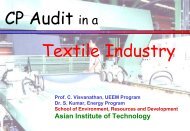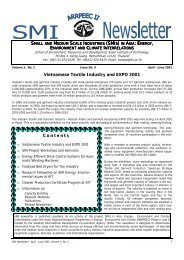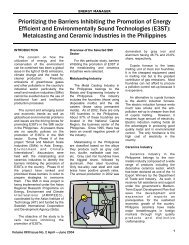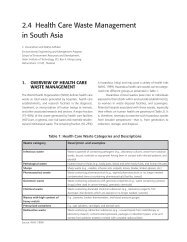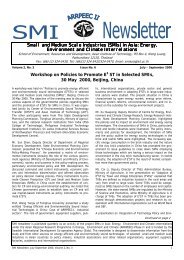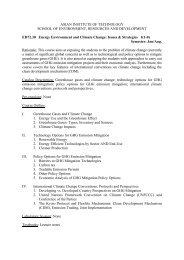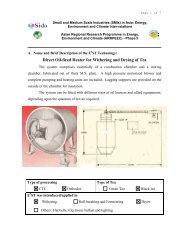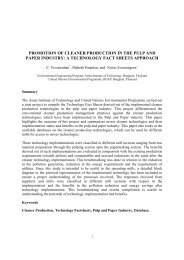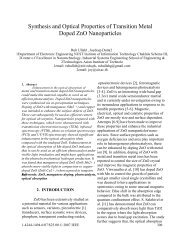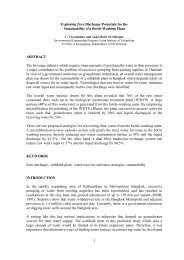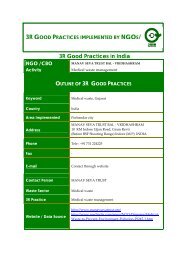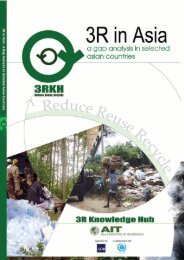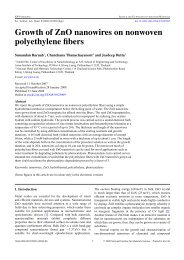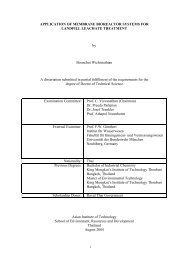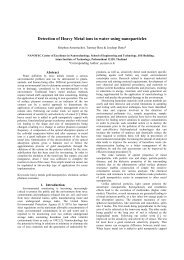Evaluation of Plastic Waste Management in Thailand Using Material ...
Evaluation of Plastic Waste Management in Thailand Using Material ...
Evaluation of Plastic Waste Management in Thailand Using Material ...
You also want an ePaper? Increase the reach of your titles
YUMPU automatically turns print PDFs into web optimized ePapers that Google loves.
1.1 Background<br />
Chapter 1<br />
Introduction<br />
Significant <strong>in</strong>crease <strong>of</strong> municipal solid wastes (MSW) is one <strong>of</strong> the ma<strong>in</strong> environmental<br />
issues <strong>in</strong> both <strong>of</strong> developed and develop<strong>in</strong>g countries. Population growth, urbanization, and<br />
<strong>in</strong>dustrialization are the causes <strong>of</strong> <strong>in</strong>creas<strong>in</strong>g solid wastes. Solid wastes which are not<br />
disposed properly will cause water and air pollution. The solid waste is also the one issue<br />
which causes global warm<strong>in</strong>g. Greenhouse gases (GHG) which are contributed by the<br />
waste combustion become the one major cause <strong>of</strong> global warm<strong>in</strong>g. Thus, the solid waste<br />
must be managed and disposed correctly to protect the environment and human life.<br />
The plastic is the one material which is much used as products <strong>in</strong> many applications such<br />
as packag<strong>in</strong>g, construction, electronic and electrical appliances, housewares, automobile,<br />
etc. The plastic packages are produced and consumed more because their products are<br />
flexible and lighter than glass and metal products. Thai people used 975 million<br />
bottles/year <strong>of</strong> PET bottle and 2,880 million bottles/year <strong>of</strong> PE bottle <strong>in</strong> 2007 (TIPMSE,<br />
2013). In 2008, they consumed 70 kg/capita/year or around 4.44 million tonnes/year<br />
(PTIT, 2008). Moreover, they also used 2.18 million tonnes/year <strong>of</strong> plastic bag (carrier<br />
bag) or around 5,000 million bags/year <strong>in</strong> 2011 (FPRI, 2011). After consumption, these<br />
plastics become wastes which must be properly managed.<br />
In <strong>Thailand</strong>, 15.98 million tonnes <strong>of</strong> municipal solid waste (MSW) was generated <strong>in</strong> 2011<br />
or around 43,799 tonnes/day. The amount <strong>of</strong> plastic waste generation was 1.84 million<br />
tonnes/year (12%) out <strong>of</strong> which plastic recycl<strong>in</strong>g was 29% <strong>in</strong> 2011 (PCD, 2011). Bangkok<br />
generated 9,237 tonnes/day out <strong>of</strong> which the plastic waste generation was 2,300 tonnes/day<br />
(25%) (GWF, 2013). <strong>Plastic</strong> wastes become one <strong>of</strong> the major problems <strong>of</strong> solid waste<br />
management <strong>in</strong> <strong>Thailand</strong>. Most <strong>of</strong> plastic wastes are disposed at landfill sites, and plastic<br />
wastes require 3 times <strong>of</strong> areas <strong>in</strong> landfills as compared with food wastes because they are<br />
durable and resist to compaction. The plastic lifespan is more than 100 years, so the<br />
government must prepare the free space at landfill sites for plastic waste disposal.<br />
<strong>Waste</strong> reduction, reuse, and recycl<strong>in</strong>g are methods to solve environmental impacts and<br />
MSW management problems. 3R policy is the one method to solve plastic waste problems.<br />
There were many projects related to 3R policy <strong>in</strong> Bangkok that are done by producers,<br />
consumers, central government, and local governments, but these projects are not<br />
susta<strong>in</strong>able because people do not practice and cont<strong>in</strong>ue projects without rewards or<br />
scheme promotions.<br />
Accord<strong>in</strong>g to the environmental management plan <strong>in</strong> 2012-2016, the waste management<br />
target is that the percentage <strong>of</strong> waste recycl<strong>in</strong>g will <strong>in</strong>crease 30% with<strong>in</strong> 2016. The 3R<br />
policy is promoted to reduce the amount <strong>of</strong> waste generation and improve much the<br />
material recycl<strong>in</strong>g, compost<strong>in</strong>g, and waste to energy. The <strong>Plastic</strong> Institute <strong>of</strong> <strong>Thailand</strong><br />
stated that the biodegradable plastic will be produced as the “Green Product” with<strong>in</strong> 2015<br />
followed by the environmental management plan <strong>in</strong> 2012-2016. The biodegradable plastic<br />
can be degraded easier than normal products, but it will be the one factor which <strong>in</strong>creases<br />
the plastic consumption and plastic wastes. Nevertheless, this product is not economical for<br />
buyers because the cost is higher than conventional plastics.<br />
1



